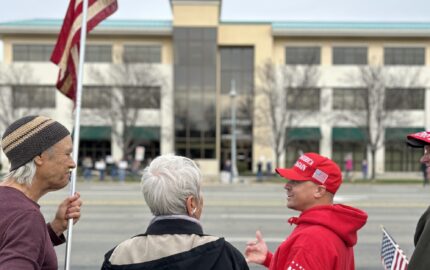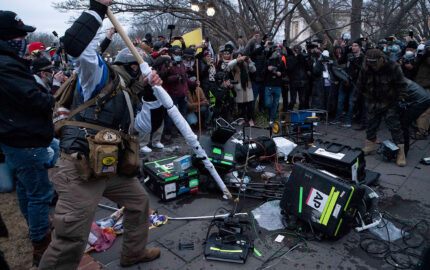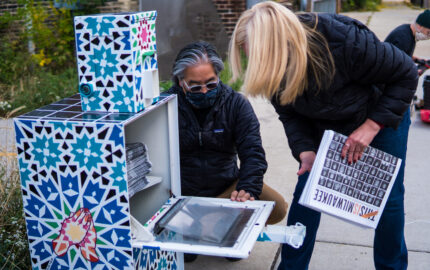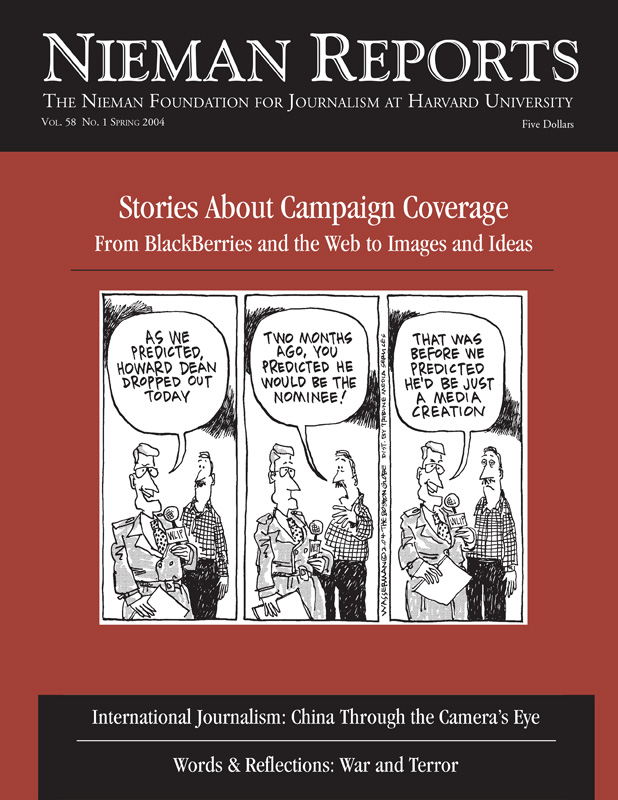
Stories About Campaign Coverage
In his essay “Only a Lunatic Would Do This Kind of Work,” David M. Shribman, executive editor of the Pittsburgh Post-Gazette, captures the essence of what motivates political journalists. “They have an ethos,” Shribman writes. “They believe in inquiry. They believe in the value of the pointed question. They believe in catching their prey in an unscripted moment or in a lie. They believe in asking impertinent questions of their social betters. They believe small deviations from a candidate’s basic stump speech have grave implications.” – Melissa Ludtke, Editor
What follows are excerpts from an essay written by David M. Shribman, a Pulitzer Prize-winning journalist who is now executive editor for the Pittsburgh Post-Gazette, and published in “The Making of the Presidential Candidates 2004,” edited by William Mayer (Rowman & Littlefield, 2003).
RELATED ARTICLE
"The Political Journalists’ Canon"
- David M. ShribmanPolitical journalism, much revered among its practitioners and much reviled among scholars, is an art form that is meant to be ephemeral. It is written by men and women in a hurry, working under impossibly trying conditions, and it is meant to be read by men and women in a hurry, reading under impossibly trying conditions; sometimes it is skimmed by well-meaning people hanging onto a subway strap but not hanging onto every word and not even gleaning the meaning ….
This art form, if the phrase be permitted, is occasionally fun to write and less often fun to read. It is often indispensable to insiders and inconsequential to others. It is indecipherable to many. It is difficult to produce and easy to ridicule. It is intertwined with the important questions of the day, and its importance has often faded by nighttime. It is produced for the literate class, but its quality almost never approaches literature.
But no one argues that it is unimportant. The founders conceived of a political system based on the considered views of an informed citizenry. The modern American system is a republican form of government with a democratic foundation; the notion that voters should be informed about their choices is implicit in our politics, and in an era of mass culture and mass media the opportunities to be informed are nearly without limit. Even so, the elected class and those who vote for its members depend on an unelected class of journalists for the information they need. It is a formula for tension among competing interests and for resentments among all the principals. It is also a formula for a fascinating struggle played out, as all American civic dramas are, in public ….
They [political reporters] think they have a broad outlook, but they think narrowly. They believe it is common knowledge that the second congressional district in Oregon borders Washington, and it is a matter of orthodoxy among them that everybody knows that South Dakota has only one member of Congress. They think that the people they stop at a shopping center care as much about the election that is approaching as their editors do. They labor under the conviction that theirs is the most important, most selfless, most vital work performed by anyone in the nation. They believe it is possible they are wrong about some things, but they think that the matters they are wrong about are little things, like how many votes Eugene V. Debs got in 1912 or how many ballots it took the Democrats to nominate John W. Davis in 1924.
In an age of doubt, they believe. They believe in the virtue of free exchange of information and ideas. They believe in the virtue of newspapers. (They are less sure about cable television.) They believe in their right to ask candidates their views on all manner of subjects. They believe in their right to ask candidates whether they think their poll ratings are so low that they ought to drop out of the race. They believe that political candidates will actually tell them the truth, even when the question is about whether they think their poll ratings are so low that they ought to drop out of the race. They believe that politicians should respect their deadlines. They believe that politics is important … .
They have an ethos. They believe in inquiry. They believe in the value of the pointed question. They believe in catching their prey in an unscripted moment or in a lie. They believe in asking impertinent questions of their social betters. They believe small deviations from a candidate’s basic stump speech have grave implications. They believe they are independent thinkers, even though their work is filtered through several layers of editors who adjust their language, trim their excesses, and assure their copy conforms with the version produced by the wire services.
Theirs is hard work, but it is meant to be read easily. They endure physical strains, mostly exhaustion, but they have an inexhaustible enthusiasm for the story. They believe that exhaustive coverage is the very best coverage. They believe, in fact, in the broader definition of coverage—that there should be nothing about politics that should remain uncovered. In non-election years they are far less orthodox about that doctrine; the thought of blanket coverage of Washington’s regulatory agencies, where real political dramas of a different sort are played out day by day, often without press witness, fills them with a primeval fear. There is no meeting of a regional governors’ association that is too obscure for them to attend. There is no meeting of the U.S. Securities and Exchange Commission that is important enough for them. They know how members of the Republican National Committee are chosen, but they are less sure about how the members of the Federal Highway Administration are chosen. They attach great meaning to the selection of the honorary chairman of the Democratic National Convention but are not sure how long the chairman of the Federal Aviation Administration serves.
They believe their jobs confer upon them immense social status. They believe that at their college reunions their classmates who head billion-dollar mutual funds or played in the World Series or Super Bowl would gladly swap lives with them for the chance to go to the Iowa straw poll, where a meaningless event has been infused with great meaning. Their editors tell them, and they believe, that they are the people’s representatives, traveling to remote country crossroads so they can tell the rest of the country what America is like …. Behind all of their bravado, however, political reporters have a deep sense of insecurity. In some of them it is actually a sense of inferiority. They know that, unlike doctors, dentists and lawyers, they are required to have no formal training. There is no licensing authority, no qualifying boards. They like to think of themselves as professionals but in truth their profession is more of a craft. They learn on the run, not in laboratories or libraries ….
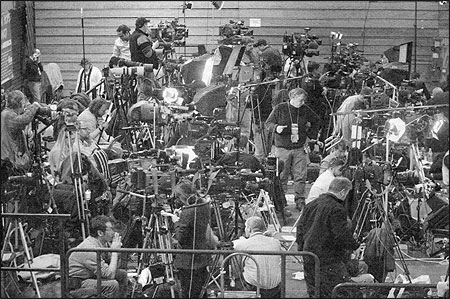
The television crews and some still photographers covering the Howard Dean rally in Manchester after the New Hampshire primary, January 27, 2004. Photo by Dina Rudick/The Boston Globe.
Bias in Political Reporting
Journalists indeed do have a strong bias, but that bias is more a bias toward change than it is a bias toward either of the political parties or toward the right or the left. The entire premise of journalism is change; journalists chronicle how the world is different today from the way it was yesterday. In years of Democratic rule, that bias often takes the form of a subtle preference for Republican gains. In years of Republican rule, that bias often takes the form of a subtle preference for Democratic gains …. This bias toward change doesn’t grow only out of the journalistic desire for something new. It also grows out of journalists’ inclination to be distrustful of established authority, which is itself a bias.
Political journalists are more vulnerable to the notion that they are inclined to fit much of what they see on the campaign trail into a narrative they have established in their minds beforehand. This critique has bipartisan support. In the 2000 election, the supporters of Al Gore believed that reporters approached the campaign with the fixed idea that the former vice president was prone to exaggeration. Similarly, George W. Bush’s supporters were convinced that reporters believed he was uninformed and careless with language. As a result, according to this argument, every time Gore committed even a meaningless exaggeration, members of the traveling press jumped all over it as evidence of their theory. The pattern worked the same way with Bush; whenever he bungled a sentence or his syntax, reporters seized on the episode as evidence of his intellectual shallowness.
Journalists are also vulnerable to charges that they are captives of their sources and of their relationships in the political establishment. This argument holds that political journalists are in too cozy a dance with politicians, that they socialize with them too intimately, that they identify with their interests too closely. Indeed, sometimes there is an unmistakable sense of we’re-all-in-this-together among politicians and the journalists who cover them. This sense is reinforced not only on the campaign trail, where as traveling companions they are thrust together in work and social settings—and often in settings where it is impossible to distinguish between the two …. A more serious problem might be the notion that political journalists and politicians share many of the same assumptions about life. They do read the same materials, see the same polls, talk with the same people, travel to the same places. They identify, moreover, with some of the same values and inclinations—big ones (like the importance of politics in the life of the nation) and little ones (like an obsession with the intricacies of public opinion research or the utility of negative campaign advertising). In short, they share the same view of the world and they share the same shorthand.
The careful journalist takes knowledge from these shared views but resists identifying with the interests of a politician or of the political class as a whole. This requires enormous discipline and vigilance. But the journalist who succeeds in achieving this can remain an outsider even while understanding the mind of the insider. That is the ultimate challenge of political reporting today.
So what are we to make of the modern journalist in the modern age?
That he or she must navigate a difficult passage, between the knowledge of the insider and the outlook of the outsider. That he must be vigilant against bias even in its most subtle form, the bias toward change that is embedded in the business of journalism itself. That the zeal of the journalist—to know, to understand, to ferret out, to write—is at once the cause of admiration within his profession and suspicion outside of it. That the work of the journalist is hard but exhilarating, that it offers an intoxicating sense of variety and a mind-numbing repetitiveness, that it is critical to the operation of democratic rule but that it is open to the criticism that is inherent in any democratic society. That the modern journalist examines the story of our time, but sometimes operates in a world whose language and assumptions are part of a small elite. That, above all, the political journalist practices an imperfect art chronicling the work of imperfect people in an imperfect system.
These excerpts are published with permission of Rowman & Littlefield from David Shribman’s essay, “Only a Lunatic Would Do This Kind of Work: A Journalist’s Perspective on the Perspective of Journalists,” included in “The Making of the Presidential Candidates 2004,” edited by William Mayer.
RELATED ARTICLE
"The Political Journalists’ Canon"
- David M. ShribmanPolitical journalism, much revered among its practitioners and much reviled among scholars, is an art form that is meant to be ephemeral. It is written by men and women in a hurry, working under impossibly trying conditions, and it is meant to be read by men and women in a hurry, reading under impossibly trying conditions; sometimes it is skimmed by well-meaning people hanging onto a subway strap but not hanging onto every word and not even gleaning the meaning ….
This art form, if the phrase be permitted, is occasionally fun to write and less often fun to read. It is often indispensable to insiders and inconsequential to others. It is indecipherable to many. It is difficult to produce and easy to ridicule. It is intertwined with the important questions of the day, and its importance has often faded by nighttime. It is produced for the literate class, but its quality almost never approaches literature.
But no one argues that it is unimportant. The founders conceived of a political system based on the considered views of an informed citizenry. The modern American system is a republican form of government with a democratic foundation; the notion that voters should be informed about their choices is implicit in our politics, and in an era of mass culture and mass media the opportunities to be informed are nearly without limit. Even so, the elected class and those who vote for its members depend on an unelected class of journalists for the information they need. It is a formula for tension among competing interests and for resentments among all the principals. It is also a formula for a fascinating struggle played out, as all American civic dramas are, in public ….
They [political reporters] think they have a broad outlook, but they think narrowly. They believe it is common knowledge that the second congressional district in Oregon borders Washington, and it is a matter of orthodoxy among them that everybody knows that South Dakota has only one member of Congress. They think that the people they stop at a shopping center care as much about the election that is approaching as their editors do. They labor under the conviction that theirs is the most important, most selfless, most vital work performed by anyone in the nation. They believe it is possible they are wrong about some things, but they think that the matters they are wrong about are little things, like how many votes Eugene V. Debs got in 1912 or how many ballots it took the Democrats to nominate John W. Davis in 1924.
In an age of doubt, they believe. They believe in the virtue of free exchange of information and ideas. They believe in the virtue of newspapers. (They are less sure about cable television.) They believe in their right to ask candidates their views on all manner of subjects. They believe in their right to ask candidates whether they think their poll ratings are so low that they ought to drop out of the race. They believe that political candidates will actually tell them the truth, even when the question is about whether they think their poll ratings are so low that they ought to drop out of the race. They believe that politicians should respect their deadlines. They believe that politics is important … .
They have an ethos. They believe in inquiry. They believe in the value of the pointed question. They believe in catching their prey in an unscripted moment or in a lie. They believe in asking impertinent questions of their social betters. They believe small deviations from a candidate’s basic stump speech have grave implications. They believe they are independent thinkers, even though their work is filtered through several layers of editors who adjust their language, trim their excesses, and assure their copy conforms with the version produced by the wire services.
Theirs is hard work, but it is meant to be read easily. They endure physical strains, mostly exhaustion, but they have an inexhaustible enthusiasm for the story. They believe that exhaustive coverage is the very best coverage. They believe, in fact, in the broader definition of coverage—that there should be nothing about politics that should remain uncovered. In non-election years they are far less orthodox about that doctrine; the thought of blanket coverage of Washington’s regulatory agencies, where real political dramas of a different sort are played out day by day, often without press witness, fills them with a primeval fear. There is no meeting of a regional governors’ association that is too obscure for them to attend. There is no meeting of the U.S. Securities and Exchange Commission that is important enough for them. They know how members of the Republican National Committee are chosen, but they are less sure about how the members of the Federal Highway Administration are chosen. They attach great meaning to the selection of the honorary chairman of the Democratic National Convention but are not sure how long the chairman of the Federal Aviation Administration serves.
They believe their jobs confer upon them immense social status. They believe that at their college reunions their classmates who head billion-dollar mutual funds or played in the World Series or Super Bowl would gladly swap lives with them for the chance to go to the Iowa straw poll, where a meaningless event has been infused with great meaning. Their editors tell them, and they believe, that they are the people’s representatives, traveling to remote country crossroads so they can tell the rest of the country what America is like …. Behind all of their bravado, however, political reporters have a deep sense of insecurity. In some of them it is actually a sense of inferiority. They know that, unlike doctors, dentists and lawyers, they are required to have no formal training. There is no licensing authority, no qualifying boards. They like to think of themselves as professionals but in truth their profession is more of a craft. They learn on the run, not in laboratories or libraries ….

The television crews and some still photographers covering the Howard Dean rally in Manchester after the New Hampshire primary, January 27, 2004. Photo by Dina Rudick/The Boston Globe.
Bias in Political Reporting
Journalists indeed do have a strong bias, but that bias is more a bias toward change than it is a bias toward either of the political parties or toward the right or the left. The entire premise of journalism is change; journalists chronicle how the world is different today from the way it was yesterday. In years of Democratic rule, that bias often takes the form of a subtle preference for Republican gains. In years of Republican rule, that bias often takes the form of a subtle preference for Democratic gains …. This bias toward change doesn’t grow only out of the journalistic desire for something new. It also grows out of journalists’ inclination to be distrustful of established authority, which is itself a bias.
Political journalists are more vulnerable to the notion that they are inclined to fit much of what they see on the campaign trail into a narrative they have established in their minds beforehand. This critique has bipartisan support. In the 2000 election, the supporters of Al Gore believed that reporters approached the campaign with the fixed idea that the former vice president was prone to exaggeration. Similarly, George W. Bush’s supporters were convinced that reporters believed he was uninformed and careless with language. As a result, according to this argument, every time Gore committed even a meaningless exaggeration, members of the traveling press jumped all over it as evidence of their theory. The pattern worked the same way with Bush; whenever he bungled a sentence or his syntax, reporters seized on the episode as evidence of his intellectual shallowness.
Journalists are also vulnerable to charges that they are captives of their sources and of their relationships in the political establishment. This argument holds that political journalists are in too cozy a dance with politicians, that they socialize with them too intimately, that they identify with their interests too closely. Indeed, sometimes there is an unmistakable sense of we’re-all-in-this-together among politicians and the journalists who cover them. This sense is reinforced not only on the campaign trail, where as traveling companions they are thrust together in work and social settings—and often in settings where it is impossible to distinguish between the two …. A more serious problem might be the notion that political journalists and politicians share many of the same assumptions about life. They do read the same materials, see the same polls, talk with the same people, travel to the same places. They identify, moreover, with some of the same values and inclinations—big ones (like the importance of politics in the life of the nation) and little ones (like an obsession with the intricacies of public opinion research or the utility of negative campaign advertising). In short, they share the same view of the world and they share the same shorthand.
The careful journalist takes knowledge from these shared views but resists identifying with the interests of a politician or of the political class as a whole. This requires enormous discipline and vigilance. But the journalist who succeeds in achieving this can remain an outsider even while understanding the mind of the insider. That is the ultimate challenge of political reporting today.
So what are we to make of the modern journalist in the modern age?
That he or she must navigate a difficult passage, between the knowledge of the insider and the outlook of the outsider. That he must be vigilant against bias even in its most subtle form, the bias toward change that is embedded in the business of journalism itself. That the zeal of the journalist—to know, to understand, to ferret out, to write—is at once the cause of admiration within his profession and suspicion outside of it. That the work of the journalist is hard but exhilarating, that it offers an intoxicating sense of variety and a mind-numbing repetitiveness, that it is critical to the operation of democratic rule but that it is open to the criticism that is inherent in any democratic society. That the modern journalist examines the story of our time, but sometimes operates in a world whose language and assumptions are part of a small elite. That, above all, the political journalist practices an imperfect art chronicling the work of imperfect people in an imperfect system.
These excerpts are published with permission of Rowman & Littlefield from David Shribman’s essay, “Only a Lunatic Would Do This Kind of Work: A Journalist’s Perspective on the Perspective of Journalists,” included in “The Making of the Presidential Candidates 2004,” edited by William Mayer.
